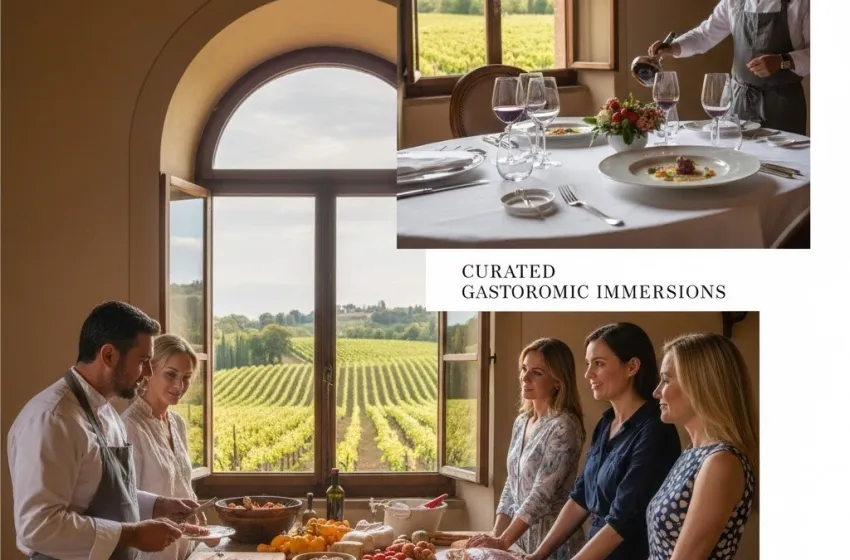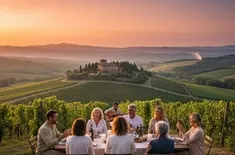Exclusive luxury travel focused on deep, private access to unique regional traditions.
In an age where travel is increasingly personalized and experiential, a new pinnacle of luxury tourism has emerged: Curated Gastronomic Immersions. This is not merely about eating well; it is about Exclusive travel focused entirely on deep, private access to unique regional culinary traditions and world-class chefs. It represents a profound, multi-sensory journey designed for the discerning traveler whose passion for food extends into the realms of culture, history, and artistry.
Unveiling the Gourmet Immersion: More Than Just a Meal
A Gourmet immersion transcends the typical fine dining experience. It transforms a standard vacation into a focused exploration of a region's edible soul. These aren't pre-packaged tours; they are meticulously planned itineraries, often crafted bespoke, that provide unparalleled access behind the kitchen doors, into the fields, and at the tables of culinary masters.
The core of this experience lies in genuine participation and education. Instead of simply being served a regional dish, the traveler is invited to understand its origin, the philosophy of its creation, and the hands that prepared it. It's an active, rather than passive, form of indulgence.
Key Components of a True Culinary Immersion:
- Intimate Access: Direct engagement with local artisans, farmers, and top-tier chefs.
- Skill-Building: Hands-on masterclasses and workshops, often in private settings.
- Cultural Context: Exploration of markets, historical sites, and culinary anthropology insights related to food production and consumption.
- Unrivaled Dining: Exclusive seating, personalized menus, and often, the chef's personal attention.
The Allure of Exclusivity: Private Chef and Michelin-Starred Access
The ultimate expression of gastronomic luxury is the element of privacy and exclusivity. This is where the travel experience truly distinguishes itself.
Private Chef Experiences
Imagine arriving at a secluded Italian villa or a chic Parisian apartment, not to dine at a restaurant, but to enjoy private chef experiences tailored precisely to your palate and dietary needs. These are often multi-day affairs where the chef sources ingredients with you from local markets, shares family recipes, and crafts meals that are an evolving dialogue between guest and cook.
These experiences break down the barrier between the kitchen and the diner, offering insights into technique, flavor balancing, and the passion that drives high-level cuisine. Furthermore, the chef often becomes a personal guide, revealing the best local vintners, producers, and hidden *trattorias* that tourists rarely find.
Michelin-Starred Dining Tours
For the ultimate epicurean, a curated immersion will include Michelin-starred dining tours. These tours are not just a series of reservations; they are pre-arranged journeys through the world's highest echelons of gastronomy. The curation ensures the sequence of dining experiences tells a story—perhaps tracking the evolution of New Nordic cuisine across Scandinavia, or contrasting classical French technique with avant-garde Spanish molecular gastronomy.
Access here is key: travelers often enjoy kitchen tours (a rare privilege), private wine pairings conducted by the head sommelier, and personalized introductions to the head chef for a conversation about their philosophy and menu concept. This deep dive transforms a three-hour meal into a lifelong memory of art and science.
Diving Deep into Heritage: Culinary Anthropology and Food Provenance
A significant differentiator of these curated tours is their grounding in education and heritage. The traveler is seeking not just the taste of food, but the story it tells.
Culinary Anthropology: The Cultural Thread
Culinary anthropology is central to the immersion. This involves exploring the historical, social, and environmental contexts of food. Why does *pho* taste different in Hanoi versus Ho Chi Minh City? How did the volcanic soil of Sicily shape its unique agricultural traditions?
Immersions often include visits to:
- Ancient Food Production Sites: Such as millennia-old olive groves or traditional fermentation cellars.
- Ethnobotanical Gardens: To understand the source and history of local spices and herbs.
- Museums and Archives: To trace the migration and evolution of signature dishes.
This intellectual engagement elevates the experience beyond simple consumption, turning it into a scholarly pursuit of flavor.
The Story of Food Provenance
The discerning traveler cares deeply about the origin of their food. Food provenance—the record of ownership, origin, and authenticity—is a hallmark of farm-to-table luxury and a core focus of these trips. The immersion often begins literally at the source:
- Hunting/Foraging Trips: With a local expert to gather wild ingredients.
- Visits to DOP/AOC Protected Farms: To witness the strict standards of quality and regionality applied to products like Parmigiano Reggiano or Champagne.
- Sustainable Fishing Charters: To understand the ethical sourcing of seafood.
Understanding provenance instills a profound appreciation for the ecosystem and the labor involved in bringing the ingredient to the plate, directly linking the landscape to the luxury experience.
From Soil to Silverware: Farm-to-Table Luxury in Practice
The farm-to-table luxury movement is perfectly embodied in these curated trips. It's a holistic philosophy that connects the agricultural process with the final culinary creation.
The Ecosystem of Taste
Instead of simply hearing about the concept, travelers live it. This might involve staying on a luxurious, working vineyard in Tuscany, participating in the olive harvest, or assisting a chef in butchering and curing locally raised heritage pork.
- Seed-to-Plate Workshops: Demonstrating the full cycle, from planting a specific heirloom tomato variety to its incorporation into a sauce served hours later.
- Ingredient Focus: Deep dives into singular, exceptional ingredients—such as Japanese Wagyu beef, rare Iranian saffron, or specific single-origin cocoa beans.
This hands-on connection to the source demystifies the process and exponentially increases the pleasure of consumption.
Conclusion: The Ultimate Investment in Experience
Curated Gastronomic Immersions are an investment in memory, culture, and personal growth. They represent the pinnacle of luxury experiential travel, offering not just a vacation, but a profound and transformative culinary education. By providing deep, private access to the world's most unique culinary secrets, they satisfy the modern traveler's desire for authenticity, exclusivity, and a genuine connection to the source of life's most enduring pleasure: incredible food. This is the future of luxury dining—a fully integrated journey from the soil to the soul.



































